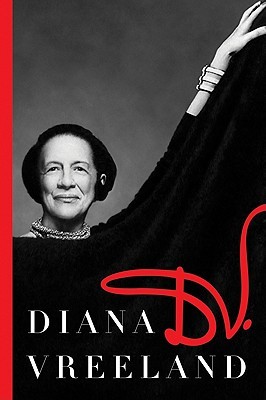
D.V.
Diana Vreeland
Edited by George Plimpton and Christopher Hemphill
Ecco, an imprint of HarperCollinsPublishers, 2011 (first published in 1984)
Diana Vreeland was the fashion world’s grande dame until her death in 1989. She was born in 1903 to a privileged family and never worked (outside a small lingerie business in Paris) until she went to work at Harper’s Bazaar at age 31. In 1962 she became editor-in-chief for Vogue and in 1973 she became a special consultant for the Metropolitan Museum of Art’s Costume Institute. In this autobiography she gives an account of her long and rich life; it is filled with anecdotes of world history from a fashion prospective that is both funny and fascinating. The book has 32 chapters, but most of them are only two or three pages long. I have included quotes from most of the chapters, which makes for a longer post. Please feel free to skip to the end to read the actual review!!
Chapter 2 – “Naturally, I’ve always been mad about clothes. You don’t get born in Paris to forget about clothes for a minute. And what clothes I saw in the Bois! [Bois de Boulogne] I realize now I saw the whole beginning of our century there. Everything was new.” Pg 13
Chapter 4 –“God was fair to the Japanese. He gave them no oil, no coal, no diamonds, no gold, no natural resources – nothing! Nothing comes from the island that you can sustain a civilization on. What God gave the Japanese was a sense of style – maintained through the centuries through hard work and the disciplines of ambition.” Pg 26
Chapter 6 –“Then, into our midst walked . . . Josephine Baker. Now that was historic: we have a black in the house. Her hair had been done by Antoine, the famous hairdresser of Paris, like a Greek boy’s – these small, flat curls against her skull – and she was wearing a white Vionnet dress, but on the bias with four points, like a handkerchief. It had no opening, no closing – you just put it over your head and it came to you and moved with the ease and the fluidity of the body. And did Josephine move! These long black legs, these long black arms, this long black throat . . . and pressed into her flat black curls were white silk butterflies. She had the chic of gay Paree.” Pg 28
Chapter 9 –“I used to see her [Queen Mary] about three times a week in London because she loved these shops where I went. The old gent who owned one of the shops said, “There is a difference between you and Her Majesty the Queen, madam, if you don’t mind my saying it. The difference is when you like something, you ask to buy it; but, you know, when Her Majesty comes in here, we lock up the best, because she expects everything for nothing.” It was really hit and run with her; she just grabbed.” Pg 64
Chapter 10 –“In retrospect, it all seems so logical. For one thing, the Prince of Wales [King Edward] was born a very modern man. I’m not sure he really believed in monarchical system. . . .Reed and I were no longer living in England by the time Edward became King and then abdicated. But my sister’s brother-in-law, Lord Brownlow, was very much involved.” Pgs 71-72
Chapter 12 –“My life has been more influenced by books than by any other one thing. . . Reed and I had seven thousand books, between our own and the boys’, that we had to sell when we sold the house in Brewster.” Pg 81
Chapter 14 –“I’ll never forget that afternoon, coming down the rue Cambon – my last afternoon in Paris for five years. I’d just had my last fitting at Chanel. I don’t think I could have made it to the end of the block, I was so depressed – leaving Chanel, leaving Europe, leaving all the world of . . . of my world.” Pg 97 [On the beginning of WW2]
Chapter 18 –“I remember the night Reed and I arrived in Paris right after the war. Oh! how it had changed! Potato flour! To think that one was eating French bread, the great French triumph, made of potatoes!” pg 114
Chapter 19 –“Of course, one is born with good taste. It’s very hard to acquire. You can acquire the patina of taste. But what Elsie Mendl had was something else that’s particularly American – an appreciation of vulgarity. Vulgarity is a very important ingredient in life. I’m a great believer in vulgarity – if it’s got vitality. A little bad taste is like a nice splash of paprika. We all need a splash of bad taste – it’s hearty, it’s healthy, it’s physical.” Pg 122
Chapter 20 –“She was extraordinary. The alertness of the woman! The charm! You would have fallen in love with her. She was mesmerizing, strange, alarming, witty . . . you can’t compare anyone with [Coco] Chanel.” Pg 128-129
Chapter 21 –“I used to spend my day at fittings. I used to fit my nightgowns. I had three fittings on a night gown. Can you imagine?” pg 134
Chapter 22 –“Power has got to be the most intoxicating thing in the world – and of all forms of power, the most intoxicating is fame.” 143
Chapter 26 –“I always carry purse scent – that way I’m never without it. Do you notice any scent on me know? Don’t come any closer – if you have to sniff like a hound, it’s not enough!” pg 161
Chapter 27 –“I don’t especially enjoy going out to evenings where someone gets up and performs – or where there’s entertainment. I much prefer talk. Good conversation is rare and becoming increasingly so.” Pg 165
Chapter 28 –“I can remember what Jackie Kennedy said, right after she moved into the White House, telling me what it looked like. There were no flowers anywhere, no place to sit, no one was expected . . . it was awful. It wasn’t even like a country club, if you see what I mean – plain. All that changed with the Kennedys. As you know, the White House changed. And the whole country changed. I couldn’t believe it happened so quickly, so beautifully – and so easily. How did it happen? Jackie Kennedy put a little style into the White House and into being First Lady of the land, and suddenly “good taste” became good taste.” Pg 170
Chapter 31 –“And when I do go to bed at the end of the day, I never go to bed tired. This was something Reed taught me: you wake up as you go to sleep. Sleep, sleep, sleep . . . this, of course, is what’s most important.” Pg 191
Chapter 32 –“When I think of my childhood, I was always alone. When I think of the war years it was the same. . . and now I’m alone again. But I knew how to be alone because I’ve been so often alone. Maybe that’s the secret of life.” Pg 192
To be perfectly honest, I had never heard of Diana Vreeland before reading this book. I’m not into fashion at all but my humom and auntie do like to look at pictures of interesting clothing. Anyway, what a fascinating woman and life she lead. I really like the way it is written – sort of breezy and effervescent and rambling. She had editors for the book but I hope it is mostly her voice.
As a white woman of privilege Diana Vreeland led a life most of us can only dream about – she traveled all over Europe, Russia, North Africa, America – and so forth. She was on the front line of history because of her associations with the various monarchs of Europe, famous designers and artists, and global events. I very much enjoyed reading history from her perspective. Some of her opinions could be considered racist and misogynistic, but I wasn’t offended so much as unsurprised that she held those viewpoints. When reading history it is important to remember the time in which the person grew up and things we take for granted today or consider offensive today were not always so. It’s important not to judge, but to learn from the past instead.
In short, I really enjoyed this book. It was easy to read, funny, filled with lush descriptions of fashions past and a cool perspective on history.
Rating: 4 out of 5 paws
 Reviewer: Jack
Reviewer: Jack

